 Our Sister site, Ventnor-Blog, has been scooping the world with announcements of who and what will be appearing at the amazing, manic extended weekend that is Bestival.
Our Sister site, Ventnor-Blog, has been scooping the world with announcements of who and what will be appearing at the amazing, manic extended weekend that is Bestival.
Besides the now-known amazing acts of The Beastie Boys, Chemical Brothers, a whole slew of talented ladies, Primal Scream, Jah Wobble and many others will be appearing.
The latest mold-breaking announcement of today is that willing punters, will themselves be able to play on stage at this coming Bestival, if they’re willing to pick up a ukulele and learn to play it.
That’s all very lovely, but what’s the relevance for Digital-Lifestyles? Well, the innovative way that enthused Uke holders will get up to speed on the required songs is via MySpace.
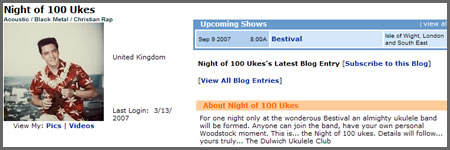
The whole jolly lot is being organised by the venerable Dulwich Ukulele Club (background) through the Night of 100 Ukes’s.
On there, in the lead up to Bestival, will appear details of the songs, the lyrics that need to be learnt and the cords that need to be sweated over in pursuit of Ukulele-nirvana.
The majority of preparation through practice will be done in the privacy of Uke-ers homes, but besides the planned rehearsal at “a central London pub” in August, Who knows, they might even choose to use Skype to Live to have remote practices.
We’re going to keep an eye on this one, both in our personal pursuit of Uke-ism and to watch how this MySpace-driven mass learning works out.
 The report found that half of all UK adults live in broadband-connected households, up 11% from 12 months ago and a hefty seven times increase from 2002.
The report found that half of all UK adults live in broadband-connected households, up 11% from 12 months ago and a hefty seven times increase from 2002. Although just under half of users had no idea how fast they were connecting to the Internet, the report put the average headline connection speed at 3.8Mbps (up from 1.6Mbps in 2005).
Although just under half of users had no idea how fast they were connecting to the Internet, the report put the average headline connection speed at 3.8Mbps (up from 1.6Mbps in 2005). If you travel around the UK a lot and find the homogenisation of High Streets into identical rows of bland coffeeshop multinationals a deeply depressing experience, you may find
If you travel around the UK a lot and find the homogenisation of High Streets into identical rows of bland coffeeshop multinationals a deeply depressing experience, you may find  Delocating the world
Delocating the world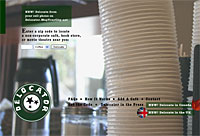 With Starbucks promising to open a new branch
With Starbucks promising to open a new branch 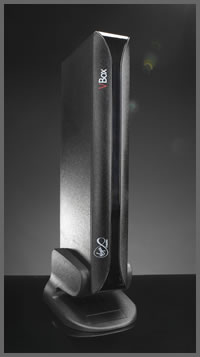 Virgin Media has ramped up the availability of its quadplay (broadband, phone, mobile and TV) services beyond its cable franchise network with today’s announcement of a new digital TV service.
Virgin Media has ramped up the availability of its quadplay (broadband, phone, mobile and TV) services beyond its cable franchise network with today’s announcement of a new digital TV service.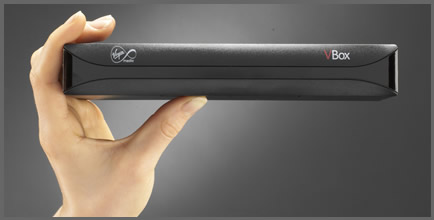
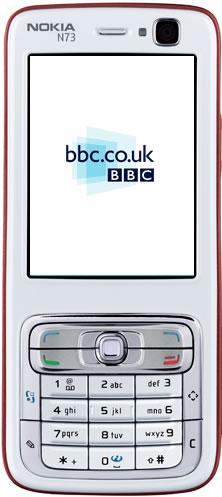 Three UK operators will be taking part, Orange, Vodafone and 3 giving subscribers to the trial the ability to watch BBC One, BBC News 24 and BBC Three streamed on their mobiles. Beyond some sports programmes and programmes where they don’t have the necessary rights.
Three UK operators will be taking part, Orange, Vodafone and 3 giving subscribers to the trial the ability to watch BBC One, BBC News 24 and BBC Three streamed on their mobiles. Beyond some sports programmes and programmes where they don’t have the necessary rights. Ofcom have just announced a new regulatory code for Voice over Internet Protocol (VoIP) service providers operating in the UK.
Ofcom have just announced a new regulatory code for Voice over Internet Protocol (VoIP) service providers operating in the UK. Before June 2007, all VoIP providers will be required to make it clear :-
Before June 2007, all VoIP providers will be required to make it clear :-
 Sitting on the tube, opposite such an ad, I figured that there were only two possible companies which could be accused of controlling 80% of information on the Web; it could plausibly refer to either Internet Explorer’s market share (and would therefore be an advert for Firefox) or Google’s market share. Since I knew Mozilla wasn’t planning any advert like this, I assumed that it was a competitor to Google, and concluded it was probably Ask (since neither Yahoo or Microsoft would manage to think outside the box to such an extent). However, I dismissed that idea instantly as it seemed so unlikely that a well respected company would attempt such a pathetic campaign, and that therefore it must be some new search engine with far too much venture capital. By that point I had lost interest, and began examining the ventilation panel.
Sitting on the tube, opposite such an ad, I figured that there were only two possible companies which could be accused of controlling 80% of information on the Web; it could plausibly refer to either Internet Explorer’s market share (and would therefore be an advert for Firefox) or Google’s market share. Since I knew Mozilla wasn’t planning any advert like this, I assumed that it was a competitor to Google, and concluded it was probably Ask (since neither Yahoo or Microsoft would manage to think outside the box to such an extent). However, I dismissed that idea instantly as it seemed so unlikely that a well respected company would attempt such a pathetic campaign, and that therefore it must be some new search engine with far too much venture capital. By that point I had lost interest, and began examining the ventilation panel.
 Ofcom has just announced that it will be carrying out an inquiry into the whole area.
Ofcom has just announced that it will be carrying out an inquiry into the whole area. The inquiry will be led by Richard Ayre, a former Deputy Chief Executive of BBC News. He is expected to receive extensive input from the premium rate services regulator, ICSTIS, who are already investigating a number of individual cases.
The inquiry will be led by Richard Ayre, a former Deputy Chief Executive of BBC News. He is expected to receive extensive input from the premium rate services regulator, ICSTIS, who are already investigating a number of individual cases. Despite a
Despite a  HDForAll are a pressure group made up of TV manufacturers, retailers and public service broadcasters including DSGI, Samsung, Sony and Toshiba and BBC, ITV, Channel 4 and Five. They’re keen to remind people that there’s only a limited amount of time left to contact Ofcom to make their views known on auctioning off spectrum to the highest bidder. Background on this and how to respond are available on
HDForAll are a pressure group made up of TV manufacturers, retailers and public service broadcasters including DSGI, Samsung, Sony and Toshiba and BBC, ITV, Channel 4 and Five. They’re keen to remind people that there’s only a limited amount of time left to contact Ofcom to make their views known on auctioning off spectrum to the highest bidder. Background on this and how to respond are available on